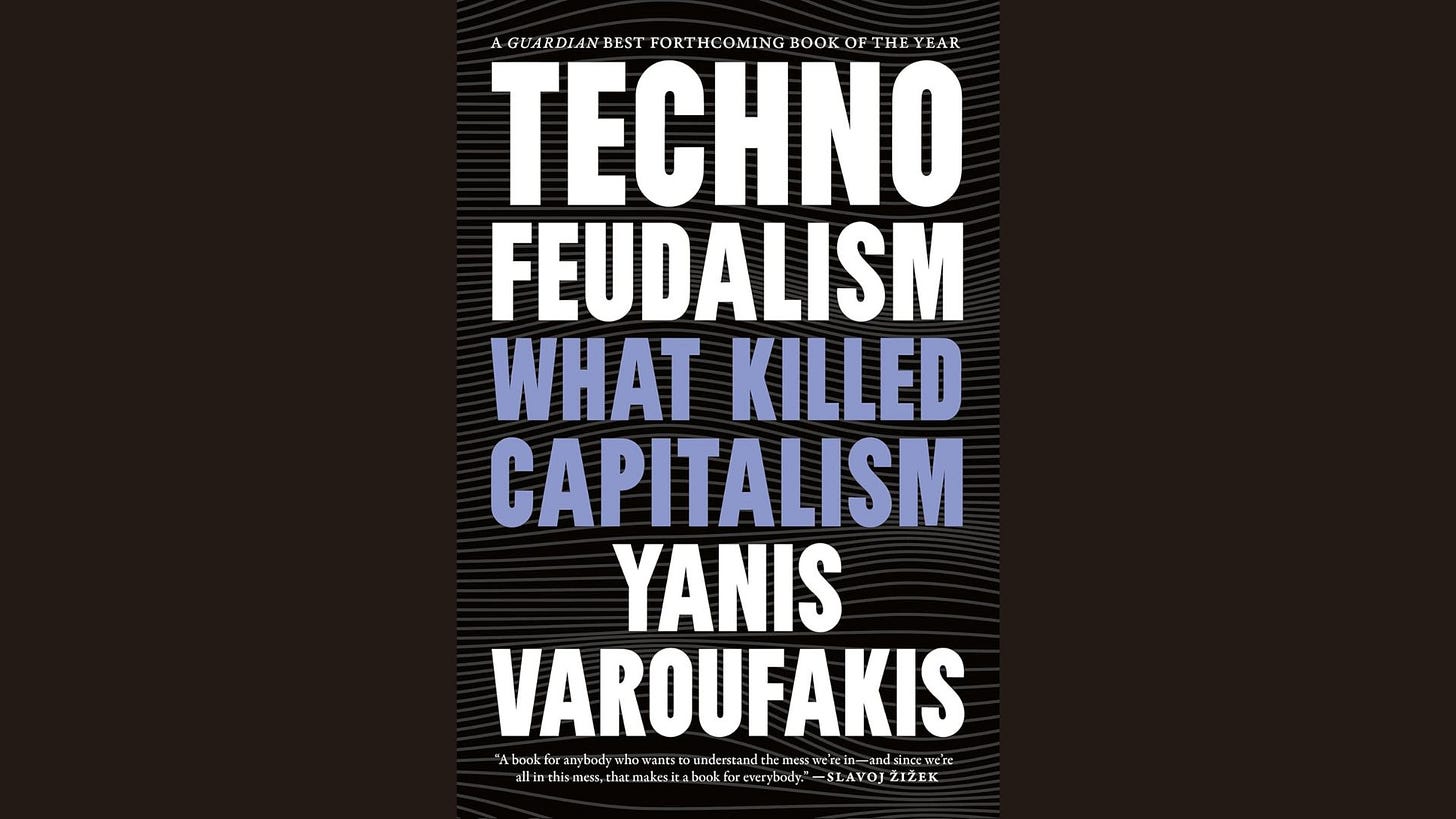Book Byte #359 "Technofeudalism" by Yanis Varoufakis
What Killed Capitalism
📣 Curious Quotes from the Author
-“You may well ask: when the bubble finally burst, why did we not let the bankers crash and burn? Why weren't they held accountable for their absurd debts? For two reasons.
First because the payment system - the simple means of transferring money from one account to another and on which every transaction relies - is monopolised by the very same bankers who were making the bets. Imagine having gifted your arteries and veins to a gambler. The moment he loses big at the casino, he can blackmail you for anything you have simply by threatening to cut off your circulation.
Second, because the financiers' gambles contained deep inside the title deeds to the houses of the majority. A full-scale financial market collapse could therefore lead to mass homelessness and a complete breakdown in the social contract.
Don't be surprised that the high and mighty financiers of Wall Street would bother financialising the modest homes of poor people. Having borrowed as much as they could off banks and rich clients in order to place their crazy bets, they craved more since the more they bet, the more they made.
So they created more debt from scratch to use as raw materials for more bets. How? By lending to impecunious blue collar worker who dreamed of the security of one day owning their own home.
What if these little people could not actually afford their mortgage in the medium term? In contrast to bankers of old, the Jills and the Jacks who actually leant them the money did not care if the repayments were made because they never intended to collect. Instead, having granted the mortgage, they put it into their computerised grinder, chopped it up literally into tiny pieces of debt and repackaged them into one of their labyrinthine derivatives which they would then sell at a profit.
By the time the poor homeowner had defaulted and their home was repossessed, the financier who granted the loan in the first place had long since moved on.”
“There was another reason why the dollar's hegemony grew: the intentional impoverishment of America's working class.
A cynic will tell you quite accurately that large quantities of money are attracted to countries where the profit rate is higher. For Wall Street to exercise fully its magnetic powers over foreign capital, profit margins in the United States had to catch up with profit rates in Germany and Japan.
-A quick and dirty way to do this was to suppress American wages. Cheaper labour makes for lower costs, makes for larger margins. It is no coincidence that, to this day, American working class earnings languish below their 1974 level. It is also no coincidence that union-busting became a thing in the 1970s, culminating in Ronald Reagan's dismissal of every single unionised air traffic controller. A move emulated by Margaret Thatcher in Britain who pulverised whole industries in order to eliminate the trade unions that inhabited them.
And faced with the Minotaur's sucking most of the world's capital into America, the European ruling classes reckoned that they had no alternative but to do the same. Reagan had set the pace. Thatcher had shown the way.
But it was in Germany and later across continental Europe that the new class war - you might call it universal austerity - was waged most effectively.”
“Brilliant and flawed, combining rare engineering talents with ridiculous public displays of ostentation, Musk is our era’s Thomas Edison – the man who, you may recall, electrocuted an elephant in order to discredit a rival.”
“Remarkably, as with all historic transformations, no one planned it. No capitalist imagined becoming a cloudalist. No central bankers aimed at funding the cloudalists. No politicians saw the damage cloud capital would inflict upon democratic politics. In the same way that capitalism came about against the will of everyone, including the kings and bishops as well as the peasants, the rise of the cloudalists happened out of sight and behind the back of the vast majority, including the most powerful of historical agents.”
“The Big Three own, which include America’s major airlines (American, Delta, United Continental), much of Wall Street (JPMorgan Chase, Wells Fargo, Bank of America, Citigroup) and car makers such as Ford and General Motors. Together, the Big Three are the largest single shareholder in almost 90 per cent of firms listed in the New York Stock Exchange, including Apple, Microsoft, ExxonMobil, General Electric and Coca-Cola. As for the dollar value of the Big Three’s shares, it has too many zeros to mean much. At the time of writing, BlackRock manages nearly $10 trillion in investments, Vanguard $8 trillion and State Street $4 trillion. To make sense of these numbers: they are almost exactly the same as the US national income; or the sum of the national incomes of China and Japan; or the sum of the total income of the eurozone, the UK, Australia, Canada and Switzerland.”
📚 Cognition of the Book’s Big Idea
Feudalism is a system based on rent, with lords using their exclusive control over land to charge their subjects fees. Contrarily, capitalism is focused on making money. Workers are compensated by capitalists to use their tools to produce new, profitable items and services that are then offered for sale in open marketplaces. But our economies are no longer dominated by markets and profit. The world is dominated by Big Tech nowadays. Markets have been supplanted by walled-off commercial zones by its firms, turning regular citizens into unpaid digital serfs and capitalists into vassals who pay rent.
Until Tomorrow,
Jason (Founder Club255)

